Advertisement
Analysis
COVID-19, A Compound Crisis For Many In Massachusetts
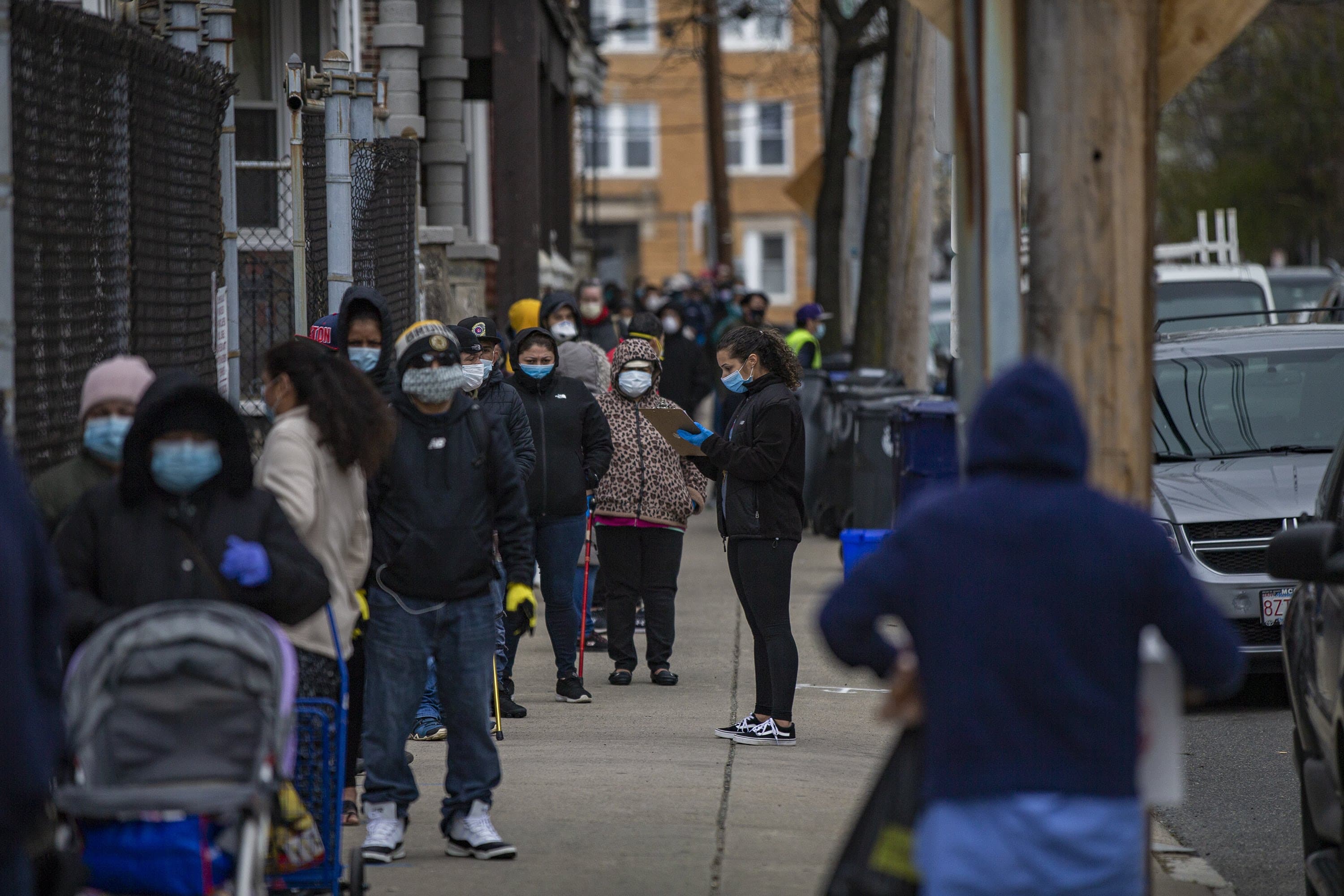
COVID-19 is hitting the same people with problems from every direction. For many towns, neighborhoods and families in Massachusetts, health problems and economic problems arrive as a pair — dragging mental health, food insecurity, and other issues behind. Even when the pandemic passes, those hit hardest will face a long and steep road to get back to something like their former lives, given the severe impacts they have felt.
Since March, we at The MassINC Polling Group have conducted and released surveys representing well over 10,000 individual interviews of Massachusetts residents. While they have covered many topics, the common thread weaving them together is the massive disparities in the toll the pandemic has taken on specific towns, neighborhoods and individual households. Some people and places are dealing with all of the worst of the pandemic, while others are still healthy, employed, adequately fed and securely housed.
Income, The Great Divide
On the most basic level, COVID has pushed the ends of the economic spectrum much further apart. Income inequality has been a major problem in Massachusetts for many years. The pandemic is making life still harder for lower income residents. This divide began almost immediately, and persists today. An MassINC Polling Group survey from late March found 23% of those under $50,000 in household income lost jobs and 44% of those still employed had lost part of their paychecks. Both were more than double the rate experienced by households over $150,000.
Higher income jobs have also returned much more quickly, white lower paid jobs are still largely missing. Add it all together, and a WBUR poll out last week shows 77% of those making over $150,000 could sustain their current situation for 4 months or more, a figure that declines sharply at lower levels of household income.
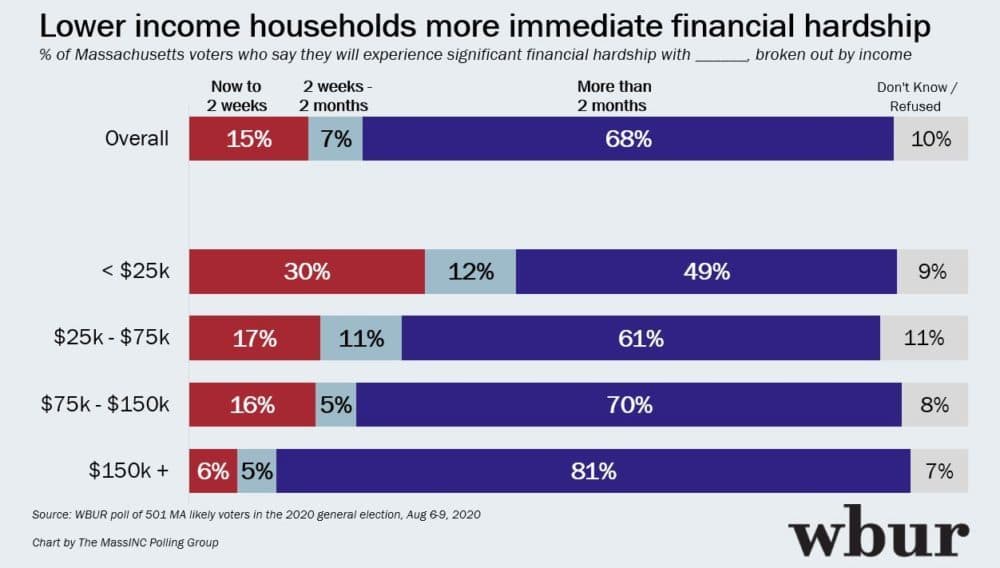
Those who can work from home have done so. But the opportunity to work from home is neither universal nor equitable. Since the beginning of the pandemic, those who have been able to work from home have had much higher levels of education and income doing desk jobs. Lower income residents and those with less education, already struggling when the outbreak began, are much more likely to have lost their jobs in huge numbers rather than transitioning to home work.
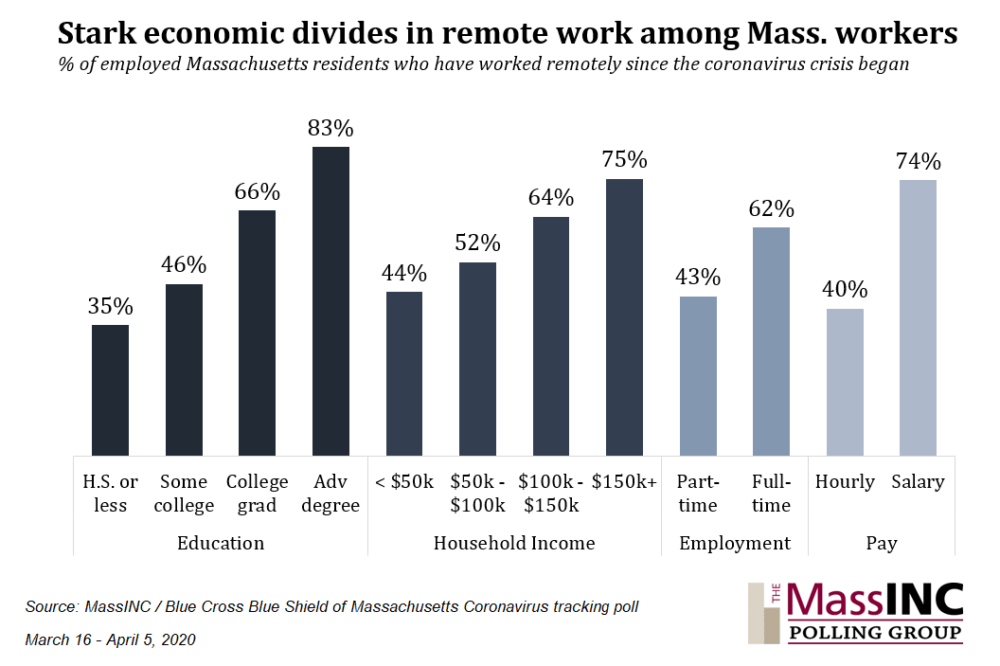
The other option for many unable to work remotely is continuing to work outside of the home, which many have done throughout the pandemic, including essential workers. But while this may provide income, it also adds risk. An MassINC survey of Latino residents out last week found 14% of essential workers said someone in their household had experienced symptoms of COVID-19, double the rate of non-essential workers.
Those in the greatest level of economic distress are far more likely to have had COVID in the household. Among residents in the highest level of economic distress, an astonishing 30% reported symptoms in the household. The link is very strong, and probably bi-directional. Those who have COVID are in more economic distress, given the challenge of dealing with serious and contagious illness on an individual or household level. And on the flip side, those in greater distress are also more likely to get COVID in the household, given the risk factors in the community.
Advertisement
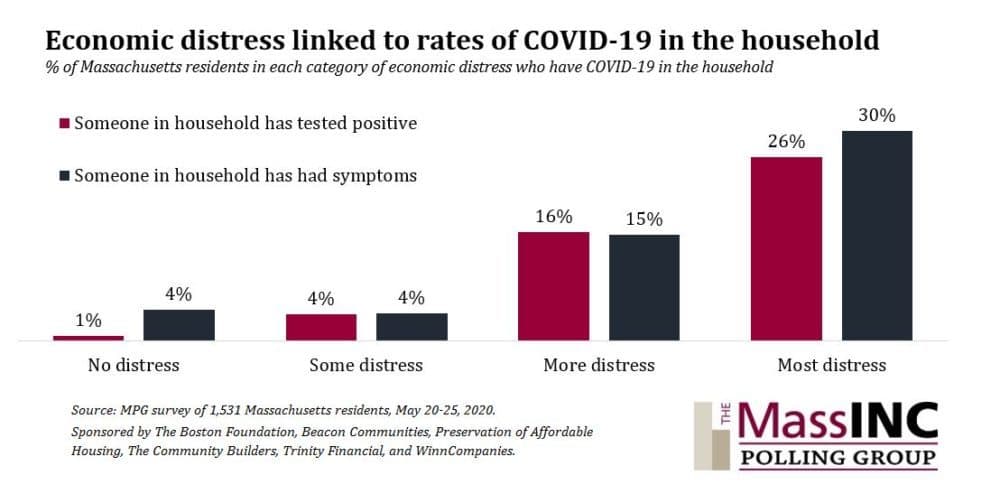
Inequities By Race And Ethnicity
MassINC’s survey of Latino results found the infection rates for essential workers is far from the only challenge Latino residents have faced. But it is a major one. Public health data, however incomplete, is clear about one thing: Latino residents have been much more likely to contract COVID-19 and to suffer serious health consequences from it. The poll also documented the devastating economic and health consequences many have felt and showed many Latinos to be among those who have been hit the hardest.
About a third (35%) of Latino residents say they have gotten food from a food bank, up from 26% in a May survey. This includes 46% of households making under $50,000 a year, adding to a growing body of evidence that food insecurity is a major challenge for Black and Latino residents across the state. The mental health impacts on Latino residents have also been significant, with 51% saying they have felt more sad and depressed than usual in recent months. The rates of mental health challenges among Latino residents experiencing unemployment (63%) or those with COVID in the household (70%) are higher still.
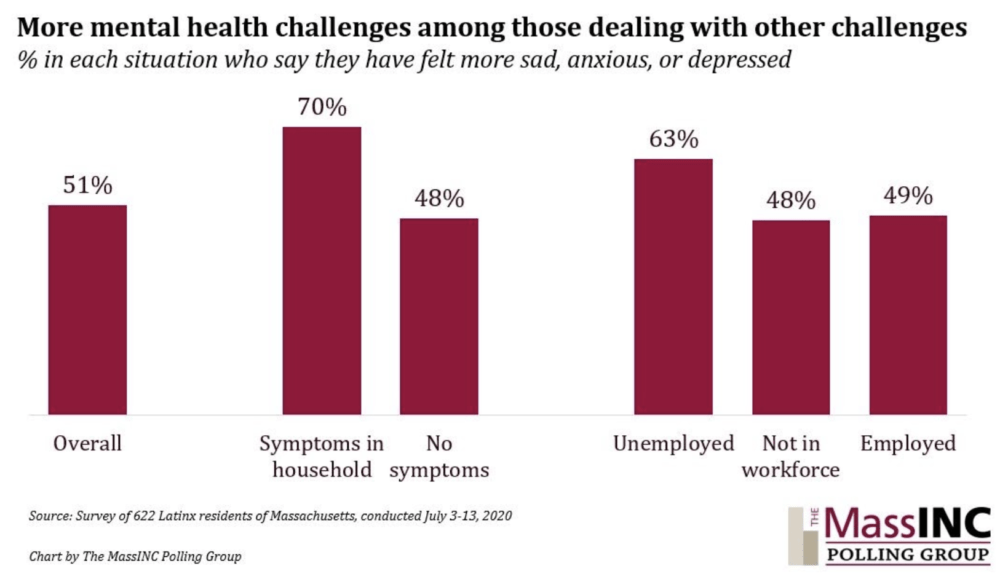
Black residents have also felt outsized pain during the pandemic. An earlier MassINC survey found economic distress affecting far more Black (45%) and Latino (50%) residents compared with state residents as a whole (21%). As with Latino residents, the impacts on Black residents extend beyond economic issues. They have also been hit harder by the pandemic itself, according to official state data and national analyses. Even recreation opportunities have been more difficult, with Black and Latino residents spending less time outdoors in the early part of the pandemic.
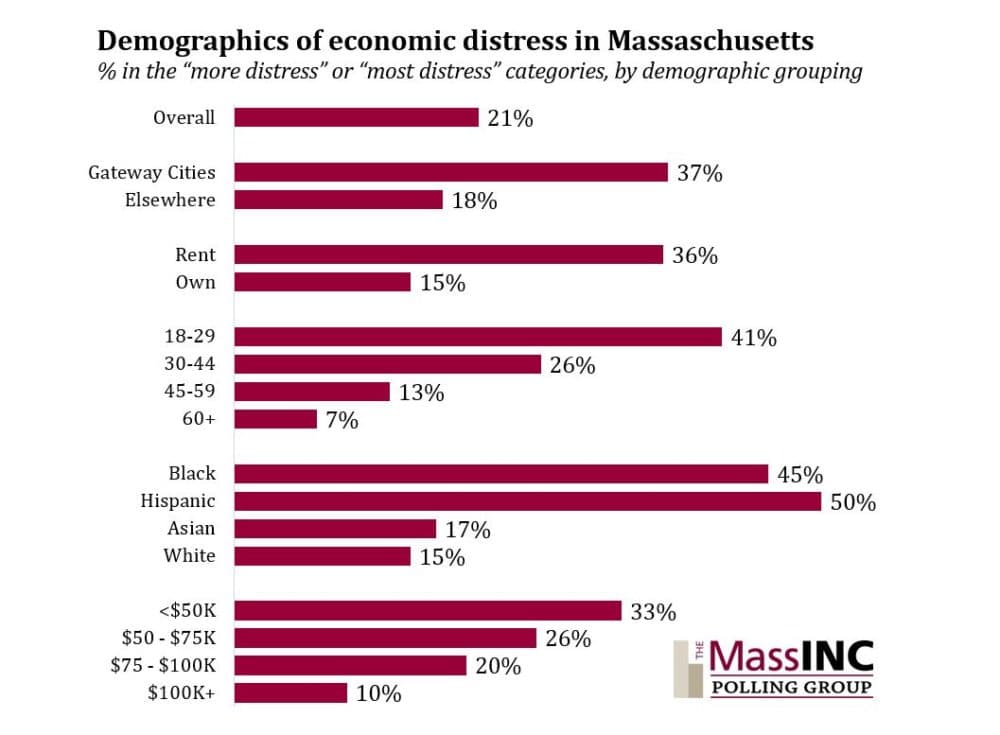
Education has been another challenge with the switch to remote learning. Black and Latino families with lower incomes faced greater difficulties dealing with remote and distance learning, according to an MassINC poll on the subject. Connecting to online classrooms and maintaining face-to-face contact with teachers proved difficult. Black families were less likely to have the devices and internet access they needed to participate fully in remote learning. Latino families were in a similar position, and many also ran into difficulties with language barriers.
Looking ahead, inequities in education seem likely to continue, as wealthier families hire private tutors or teachers to bridge the gap between home and remote schooling for the coming year. Even beyond that, the setbacks may continue, as those without devices, those with language barriers, lower income and non-white parents of 10th through 12th graders are more likely to say their children may delay entrance into college, according to an MassINC poll of these parents.
POC-Owned Businesses Faring Worse
In the world of compounding COVID problems, things don’t stop with just education, jobs, mental health, physical health, college, food insecurity and exercise — as if those were not enough. They also extend out of the home and onto main streets, where businesses owned or founded by people of color have lost more of their income than white-owned businesses. An MassINC poll of small businesses finds those owned by people of color more likely to have fallen behind on rent and other bills, imperiling their existence.
Some of these challenges are due to business size — micro businesses have tended to fare worse than businesses of even modest size, struggling to reopen, secure PPP loans, and shift to online sales formats where possible. These same micro-businesses are more likely to be owned by people of color and women. PPP loans, designed to help businesses keep their payroll intact in the early days of the crisis, did not reach businesses equally. Latino- and Black-owned businesses were less likely to apply for PPP and less likely to receive the full amount they requested.
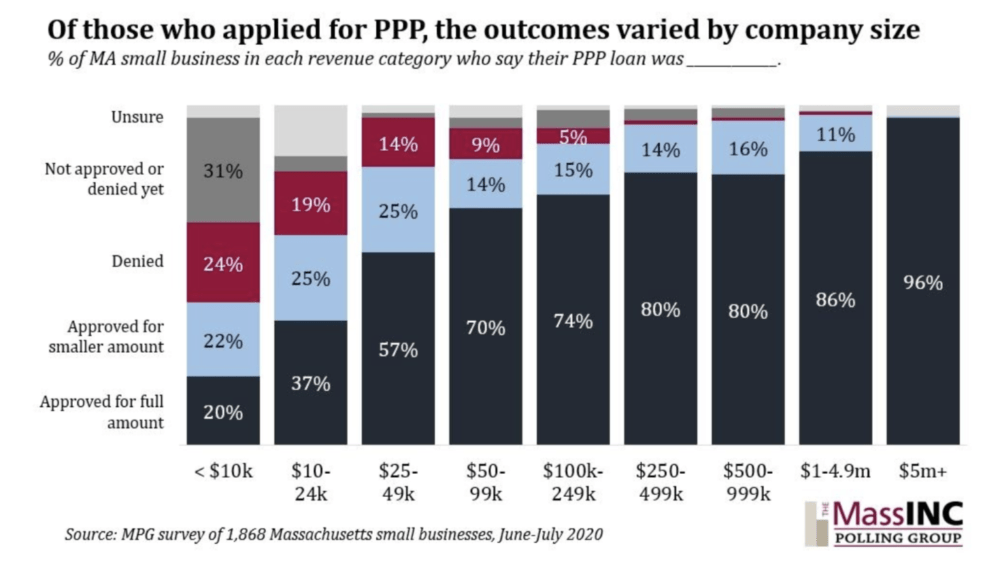
These challenges could bring major and long term damage to main streets across Massachusetts. If businesses owned by people of color shut down in larger numbers, the worst of the economic destruction will be localized, laying waste to large strips of specific cities and towns like a tornado touching down.
An Uncertain Future For Younger Adults
Those starting their adult lives in the midst of the economic wreckage are also likely to feel the residual impacts for a long, long time. Young people fall into many of the groups hit hardest by the pandemic: renters, part-time and hourly workers, and parents of young children. As a result, many have lost jobs and fallen behind on rent. Among those under age 30, 35% had already missed a housing payment by June compared to just 4% of those over age 60. Similarly, 41% of those under 30 were in a higher category of economic distress, six times the rate of those over 60 (7%).
In the next few weeks, parents are facing the prospect of starting another year of remote schooling, adding a further challenge to younger people. Our education survey found the youngest learners also require the most parental attention. Already struggling with employment and keeping up with bills, this will add another demand on young people’s time who have K-12 children at home. The school year is also likely to be a special challenge to women, who were much more likely than men to say they were primarily responsible for remote learning during the last school year. With another school year coming and many districts starting remote, additional job impacts seem likely.
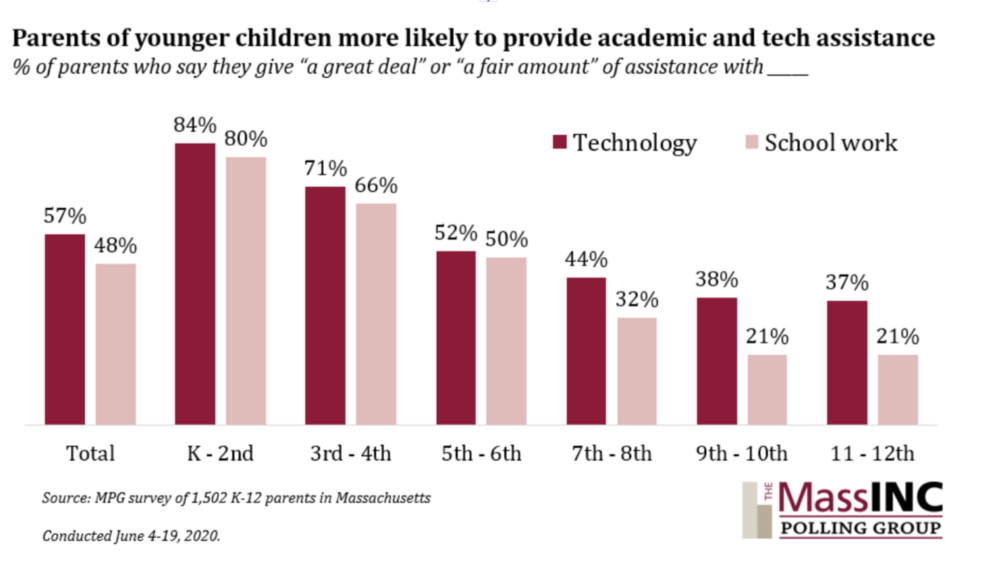
The Shape Of The Challenge Ahead
COVID has flowed into every crack, crevice and fault line in American life and pushed us apart, exposing old rifts and making new ones. Some here in Massachusetts are standing on shaky ground, nervous but unharmed. Others are struggling to an extent difficult to fathom or to fully capture in an article like this one. Long after the crisis ends, people and families will be picking up pieces of their lives, scattered by the many impacts of the pandemic.
